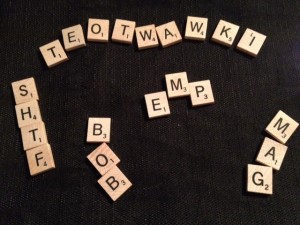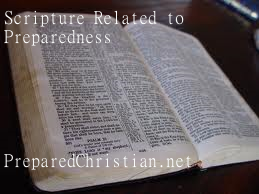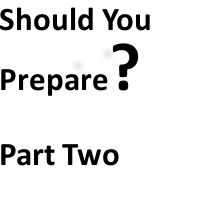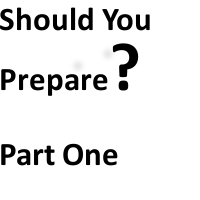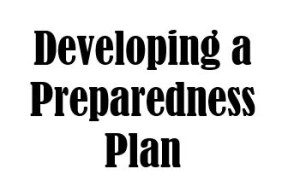
Now I want to cover where you should start, or what you should do next, for those who are not new to preparedness.
If you’re new, first things first, do not panic, you have time. If you concentrate on everything you are not prepared for, you may begin to feel overwhelmed. Take a deep breath and remember that God is in control. That might sound cliché but I mean it. He was in control before you decided to prepare, He is in control now, and will continue to be in control if you are prepared or not. Pray, ask Him for peace and to guide you.
I wish there was a ten-step plan that I could tell you to follow to becoming prepared. But the truth is your plan needs to be yours. I do not know your situation, your location, your budget, but what I can do is give you some guide lines and things to consider. Here are some philosophies that can help you come up with a preparedness plan.
Disaster Probability
Jack Spirko over at The Survival Podcast does a great job explaining disaster probability and impact in Episode 474.
Jack drops an S-bomb now and then, so if you’re easily offended be forewarned. For those that don’t have the time to listen I’ll try to do a quick recap. The events that have the highest probability of happening have the smallest area of damage. Events that affect the greatest number of people have the smallest chance of happening. As an example, you losing your job has a much higher chance of happening then an EMP that takes out the electric grid. Your job loss has an affect on your family, while the EMP would affect much of the nation.
Threat Assessment
If disaster probability says that the things most likely to happen will be acute in nature, threat assessment pinpoints what those are.
Let’s say I live in an area that has overhead power lines and is prone to ice storms every year or two that causes power outages of varying lengths. Disaster probability would say that an ice storm is a higher risk then a pandemic. Threat assessment says if there is an ice storm, the possible threats are:
-Loss of power; if there is no power then I have no means to keep food cold.
If my primary heat source uses electricity, I could be without heat.
-Loss of transportation, if the ice storm is bad enough, there may be no way for me to get to the grocery store.
Basic Human Needs
There are five basic requirements that every human needs; shelter, water, food, fire (energy) and security. At different times one need might be more critical then another, for now, apply them to the threats listed from the ice storm.
With a generator I can mitigate the loss of power and get the fridge and freezer running. If my primary source of heat needs electricity then I can mitigate that as well. However, the more load I put on the generator, the higher wattage it is going to need to put out, the more expensive the generator becomes, plus the more I run it, the more fuel needed to keep it running.
The fuller a fridge or freezer is, the less energy it takes to keep everything frozen. There are things I could do such as keep 2-liter containers filled with ice, in the bottom of the freezer to take up empty space. This will mean less energy to run the motor to keep things frozen and the ice will keep things frozen longer.
I could also only have the fridge and freezer connected to the generator and only run it an hour or so in the morning and evening, this should keep things frozen. I could get an indoor propane heater and a couple 20 Lbs propane tanks for my heat source.
The last threat I need to take care of is the possibility of not being able to get to the grocery store. For this I can make sure I have at least one week worth of food and water stored ahead of time. If you’re new to prepping, one week is an acceptable place to start, if you have been prepping for any length of time you should have considerably more.
Making a Plan
Now that I have covered the basics of finding your most likely threats, I’ll give some tips.
Get a notebook and dedicate it to prepping. Write down every need, want and idea. This doesn’t mean you need to get them now, but at least it is on your mind. I recently looked at the list I made when I started; I have most but not all of the items on it.
Start small, don’t try to fill every hole at once; that is a good way to burn out and spend a lot of money in a very short amount of time. However, action is better then inaction, pick a threat and work toward mitigating it.
Your plan needs to be flexible and so do you. The biggest threat to you may change suddenly; another key ability for preppers/survivalists is adaptability. Don’t get so focused on one thing that you lose sight of your overall preparedness.
Indecision
Some people freeze when faced with a blank slate, they have a hard time finding individual steps, let alone putting them in order. Others can figure out the steps, but have a hard time with the order. For those people I will give a very basic plan, once you get started I’m sure you’ll find your stride.
Start with three days of food and water for every member of your family. Don’t forget pets. Plan on two gallons of water per day per person, this will take care of drinking, food preparation and hygiene. Once you have three days, move to a week and then two weeks, set thirty days as a goal for now.
Get a secondary means to cook food and fuel for it; camp stove, outdoor grill, propane or charcoal. Also put up a thirty-day supply of toilet paper and other paper products you may need.
By becoming prepared for the things that are most likely to happen, you also become more prepared for the less possible, high impact things like a pandemic, another great depression and a zombie invasion.
If you want to bounce ideas off of someone or have a question, please feel free to e-mail me, I’ll do what I can to help.
http://www.ready.gov/ has some good basic info.
FEMA’s Are You Ready? has a lot of info.
Please click here to vote for Prepared Christian as a top Prepper site!
If you liked this article please think about sharing it on the social media listed below, thanks!

